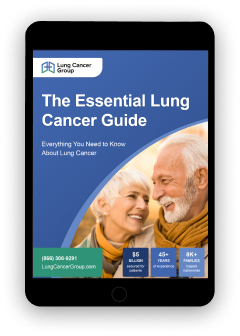Immunotherapy for Lung Cancer
Lung cancer cells can sometimes escape your body’s immune response, but immunotherapy prevents this. Immunotherapy for lung cancer boosts the immune system so it attacks cancer cells. Find out more about lung cancer immunotherapy and see how we can help you afford treatment costs.
What Is Immunotherapy for Lung Cancer?
Immunotherapy for lung cancer improves the way the immune system works to kill malignant (cancerous) cells and tumors.
Each person’s immune system is supposed to protect from foreign cells, such as the ones that make up bacteria. But lung cancer cells are mutated versions of normal cells, so they could escape detection from the immune system.
 Immunotherapy drugs are a workaround: With them, the cancer cells that are hiding can be found and killed.
Immunotherapy drugs are a workaround: With them, the cancer cells that are hiding can be found and killed.
Lung cancer immunotherapy treats both types of lung cancer, including non-small cell lung cancer (NSCLC) and small cell lung cancer (SCLC). Further, the American Cancer Society (ACS) notes that patients at any stage of lung cancer may be able to get immunotherapy treatments.
Learn more about immunotherapy for lung cancer and affording this treatment with a Free Lung Cancer Guide.

- Understand risk factors
- Find top treatments
- Pursue compensation



How Immunotherapy Treats Lung Cancer
Most immunotherapy drugs approved by the Food and Drug Administration (FDA) are immune checkpoint inhibitors.
Here’s how this type of immunotherapy for lung cancer works:
- Lung cancer cells make proteins: Lung cancer cells release proteins that trick the immune cells (T cells) not to attack. T cells are the main cells that the immune system produces to kill harmful cells. The proteins on the lung cancer cells attach to the T cells’ protein receptors so they won’t be destroyed.
- Immunotherapy drugs interfere: Immunotherapy drugs disrupt the interaction between the protein receptors on T cells and the proteins on cancer cells.
- T cells reactivate: Because the immunotherapy drugs have stopped the cancer proteins, the T cells reactivate and target the lung cancer cells, allowing the body to fight and prevent cancer from spreading.
Other types of lung cancer immunotherapies work in slightly different ways.
Types of Lung Cancer Immunotherapy
There are three main types of lung cancer immunotherapy medications: immune checkpoint inhibitors, cancer vaccines, and adoptive T cell therapy.
Learn about each type below.
Immune Checkpoint Inhibitors
Immune checkpoint inhibitor drugs make it easier for your body to spot and kill cancer cells by blocking certain proteins.
Examples of immune checkpoint inhibitor drugs include:
- Atezolizumab (Tecentriq) and durvalumab (Imfinzi): Both of these block a protein called PD-L1, which can boost the immune response against cancer cells.
- Pembrolizumab (Keytruda), cemiplimab (Libtayo), and nivolumab (Opdivo): These block PD-1, a protein that is related to PD-L1.
- Ipilimumab (Yervoy) and tremelimumab (Imjudo): These target CTLA-4, another protein on T cells that can keep them from destroying cancer cells. Doctors usually prescribe these drugs with a PD-1 inhibitor.
- Bevacizumab (Avastin): This medication blocks vascular endothelial growth factor (VEGF). VEGF controls the blood vessels in lung cancer tumors. Without new blood vessels, lung cancer tumors will shrink and die.
- Amivantamab (Rybrevant): This targets MET and epidermal growth factor receptors found in lung cancer cells.
Immune checkpoint inhibitors are some of the most commonly used immunotherapies for lung cancer. Some combinations have recently received FDA approval to treat additional types of cancers including mesothelioma.
Learn how to afford these treatments: Call (877) 446-5767 now.
Cancer Vaccines
Cancer vaccines try to get your immune system to attack cancer cells by targeting antigens (substances on cancer cells that healthy ones do not have), according to the American Society of Clinical Oncology (ASCO).
There are two types of cancer vaccines:
- Cancer treatment vaccines: These can help patients fight cancer after a diagnosis. Arguably the most notable lung cancer immunotherapy vaccine is CIMAvax-EGF. This treats lung cancer by preventing the cells from getting epidermal growth factor, a protein they rely on to survive.
- Preventive vaccines: These stimulate the immune system to destroy certain viruses that increase the risk of cancer later in life. As of 2023, Roswell Park Comprehensive Cancer Center is studying how CIMAvax-EGF can be used as a preventative lung cancer immunotherapy vaccine.
Lung cancer vaccines are still being studied in clinical trials and are not widely available yet.
CAR T Cell Therapy
Through chimeric antigen receptor (CAR) T cell therapy, also known as adoptive T cell immunotherapy, doctors remove T cells from the patient, enhance them so they’re better able to fight lung cancer cells, and put them back into the body.
At this time, CAR T cell immunotherapy for lung cancer is still being investigated. However, a 2022 report from the medical journal Thoracic Cancer noted that it shows promise because it’s been helpful in treating blood-related cancers.
“Importantly, improving the killing effect of CAR‐T cells on tumor cells and prolonging the survival time of patients with cancer are also urgent issues to be addressed in future research.”
— Thoracic Cancer
We can help you afford the best lung cancer immunotherapies and other treatments. Get a Free Lung Cancer Guide to learn more.



- Understand risk factors
- Find top treatments
- Pursue compensation



What to Expect During a Lung Cancer Immunotherapy Session
Receiving immunotherapy drugs for lung cancer can be daunting, especially if it’s your first time.
Here’s a summary of what to expect:
- First, you will go to your medical center, doctor’s office, or hospital on the date of your appointment.
- You will receive the drug through an intravenous (IV) line, usually in your arm. Each treatment session takes 30 to 90 minutes.
- Depending on which drug you’re prescribed, you will receive a dose every 2 to 3 weeks until you have certain side effects or your lung cancer tumors shrink.
- After a recovery period, you may have to repeat this process for multiple cycles of immunotherapy over a few months.
Talk to your cancer care team about the location, dates, and length of your appointments, as well as your overall treatment plan.
Immunotherapy Side Effects for Lung Cancer
Like other cancer treatments, lung cancer immunotherapy can cause side effects.
These side effects are different for everyone and depend on various factors, such as the specific immunotherapy drugs you receive, your general health, the type and stage of lung cancer you have, and other factors.
Common side effects of lung cancer immunotherapy include:
- Appetite loss
- Cough
- Diarrhea and constipation
- Fatigue
- Itching
- Joint pain
- Skin rash
Talk to your health care team if you experience severe side effects of immunotherapy for lung cancer.
Lung Cancer Immunotherapy and Other Treatments
Besides immunotherapy, you may receive other lung cancer treatments. Depending on your health, lung cancer type, and other factors, these treatments may include the following.
Surgery
Lung cancer surgery involves a doctor cutting out cancerous tissue. Immunotherapy is typically less hard on the body than surgery. However, surgery is often very effective.
Immunotherapy may be used before surgery to shrink a cancer tumor or after to kill cancer cells that couldn’t be surgically removed, according to the American Cancer Society (ACS).
Call (877) 446-5767 to learn how you can afford lung cancer treatments like surgery and immunotherapy.
Chemotherapy
Chemotherapy involves using special medicines to kill or shrink lung cancer. Because chemotherapy kills both good and bad cells, it also has more side effects.
The ACS notes that chemotherapy and immunotherapy are often used together to help lung cancer patients live longer.
Radiation Therapy
This cancer treatment uses high-energy rays to kill lung cancer tumor cells. The ACS notes that immunotherapy may be used as adjuvant therapy after chemotherapy and radiation to kill stage 3 NSCLC tumors in some cases.
Targeted Therapy
Immunotherapy is actually considered a subset of a wider treatment branch called targeted therapy.
These therapies target elements unique to lung cancer cells so the cancer can be killed with less damage to healthy cells.
Benefits of Immunotherapy in Lung Cancer Treatment
Immunotherapy for lung cancer provides several benefits, especially when compared to the different treatments listed above.
These include:
- Boosts your body’s natural immune response.
- Does not attack normal cells, unlike chemotherapy.
- Has fewer severe side effects than other treatments like surgery and chemotherapy.
How Immunotherapy Affects Lung Cancer Prognosis
Though lung cancer has a poor prognosis (expected health outcome), immunotherapy may help patients live longer.
For example, 79% of advanced NSCLC patients were still alive two years after stopping a two-year immunotherapy treatment plan in a 2023 Jama Oncology study. The two-year survival rate increased to 81% in NSCLC patients who received immunotherapy longer than 2 years.
Talk to your health care team to learn if immunotherapy can help improve your lung cancer prognosis.
Cost of Immunotherapy for Lung Cancer
The cost of immunotherapy for lung cancer varies depending on the treatment plan and drug type.
However, lung cancer immunotherapy drugs tend to be very expensive. When used to treat late-stage lung cancer, one infusion of Opdivo costs $7,194 without insurance. A combination of Opdivo and Yervoy costs $23,597.
Fortunately, the costs of immunotherapy for lung cancer and other expenses may be covered by your insurance.
Further, if your lung cancer stems from asbestos exposure, you may be eligible to file private claims to help with medical bills. Contact our team now to learn more.
Find Immunotherapy Treatment for Lung Cancer
Immunotherapy for lung cancer is one of several key treatment options that could help you live longer. When used alongside other treatments like chemotherapy, long-term survival may be possible.
Reach out to a doctor to find out if immunotherapy for lung cancer might be an option for your case. Doctors can see if your cancer might respond well to immunotherapy treatments.
Further, Lung Cancer Group can also help you pursue financial compensation so you can afford immunotherapies and other medications.
Call (877) 446-5767 now or get a Free Lung Cancer Guide to learn more.
FAQs on Immunotherapy for Lung Cancer
What is the success rate of immunotherapy for lung cancer?
Immunotherapy can help lung cancer patients live longer and healthier lives.
According to a 2023 Clinical Cancer Research study, the 5-year survival rate for early-stage NSCLC patients treated with immunotherapy was 80%.
Generally speaking, the 5-year survival rates for early-stage patients who were treated with traditional therapies ranged from 68% to just 36%.
Can immunotherapy get rid of lung cancer?
Possibly. By getting immunotherapy, your cancer may enter remission (where the signs go away) or stabilize (where it’s still in your body but not spreading).
The earlier your medical team detects your lung cancer, the better your chances of becoming cancer-free.
What type of lung cancer is treated with immunotherapy?
Both of the main types of lung cancer — non-small cell lung cancer and small cell lung cancer — can be treated with immunotherapy.
However, not every patient will be able to receive immunotherapy for lung cancer. Connect with your lung cancer care team to learn more.
What is the life expectancy of someone on immunotherapy?
How long you can survive with immunotherapy depends on your overall health, the stage and type of lung cancer, and your age.
In a 2020 study published in the Journal of Clinical Oncology, patients with advanced NSCLC who received pembrolizumab lived for 16.9 months on average.
Talk to your doctor to learn how immunotherapy for lung cancer can help you live longer.

